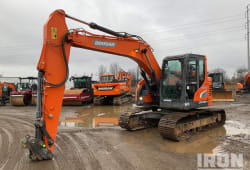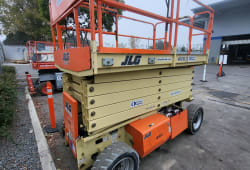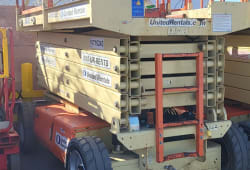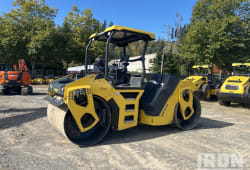Grounding and Electrical Safety for Heavy Equipment Operators
13 Min read
)
August 11, 2023
Heavy equipment operators play a crucial role in various industries, including construction, mining, and manufacturing. Operating heavy machinery comes with its own set of risks, and one of the most important aspects of ensuring operator safety is proper grounding and electrical safety. In this article, we will explore the basics of grounding, the importance of electrical safety, grounding techniques for heavy equipment, safety measures, training and education, case studies, and future trends in grounding and electrical safety in the heavy equipment industry.
Understanding the Basics of Grounding
Grounding is a fundamental concept in electrical systems that involves connecting an electrical circuit to the ground. But what exactly is grounding? Grounding refers to the act of establishing an electrical connection between an electrical device or equipment and the earth. This connection provides a path for electrical currents to flow safely to the ground in the event of a fault or malfunction.
Grounding serves several purposes. Firstly, it helps prevent electrical shocks to operators by directing any stray electrical current into the ground. This is especially important in environments where operators are exposed to high-voltage equipment or power lines. By providing a safe pathway for electrical currents, grounding ensures the safety of personnel working with or around electrical systems.
Secondly, grounding protects equipment by providing a low-resistance path for fault currents to dissipate, preventing damage to the machinery. In the absence of grounding, fault currents can flow through unintended paths, such as equipment casings or metal structures, causing damage and potentially leading to equipment failure. Grounding ensures that fault currents are safely directed away from sensitive components, preserving the integrity and lifespan of the equipment.
Additionally, grounding helps ensure consistent voltage levels and minimizes the risk of electrical fires. By establishing a reliable connection to the earth, grounding helps to stabilize voltage levels and reduce the likelihood of voltage fluctuations. This is particularly important in sensitive electronic systems where even slight variations in voltage can cause malfunctions or damage. Furthermore, grounding provides a path for fault currents to flow away from the equipment, reducing the risk of excessive heat buildup and potential fires.
What is Grounding?
Grounding is a method of connecting electrical equipment or systems to the earth or a reference point that is at zero voltage. When electrical equipment is properly grounded, it helps maintain the safety of operators and the integrity of the equipment itself. Grounding is achieved by using a grounding conductor, which is usually a copper wire, that connects the equipment to a grounding electrode, such as a metal rod buried in the ground.
The grounding conductor acts as a protective measure, providing a low-resistance path for electrical currents to flow to the ground. This ensures that any fault currents or stray electrical currents are safely directed away from the equipment and operators. Without proper grounding, electrical systems are more susceptible to voltage surges, electrical shocks, and equipment damage.
Importance of Grounding in Heavy Equipment Operations
In heavy equipment operations, proper grounding is vital for several reasons. Firstly, it protects operators from electrical shocks. When heavy machinery comes into contact with power lines or other sources of electrical energy, electrical faults can occur, resulting in machinery becoming energized. This poses a significant risk to operators who may come into contact with the energized equipment. Proper grounding provides a safe pathway for the electrical current to flow to the ground, preventing operators from being exposed to potentially fatal electric shocks.
Secondly, grounding helps prevent electrical fires. Heavy equipment, especially those with motors, contains various electrical components that generate heat. Faults or malfunctioning parts can cause excessive heat buildup, which can lead to fires. Grounding provides a path for fault currents to flow safely away from the equipment, reducing the risk of fiery accidents. By dissipating fault currents to the ground, grounding helps to maintain the overall safety of heavy equipment operations.
Furthermore, grounding plays a crucial role in maintaining the reliability and efficiency of heavy machinery. By providing a low-resistance path for fault currents, grounding helps to minimize voltage fluctuations and stabilize the electrical system. This ensures that heavy equipment operates within the specified voltage range, avoiding potential malfunctions or damage caused by voltage variations. Grounding also helps to reduce electromagnetic interference, which can affect the performance of sensitive electronic components in heavy machinery.
In conclusion, grounding is a vital aspect of electrical systems, providing safety, protection, and stability. It safeguards operators from electrical shocks, protects equipment from damage, and reduces the risk of electrical fires. Whether in heavy equipment operations or any other electrical application, proper grounding is essential for maintaining the integrity and reliability of electrical systems.
Electrical Safety: A Must for Heavy Equipment Operators
While grounding plays a significant role in ensuring electrical safety, it is only one piece of the puzzle. Heavy equipment operators must be equipped with the knowledge and understanding of electrical safety practices to protect themselves and others around them. Electrical safety measures are crucial to minimize the risk of accidents and potential hazards that can arise from working with heavy machinery.
The Role of Electrical Safety in Heavy Equipment Operations
Electrical safety measures are designed to prevent electric shock, electrocution, equipment damage, and fires caused by electrical faults or malfunctions. Operators must be aware of potential electrical hazards, including contact with power lines, faulty electrical connections, insulation failure, and improper maintenance. By following electrical safety protocols, operators can minimize the risk of accidents and create a safer work environment.
Furthermore, electrical safety practices extend beyond the operators themselves. They also protect other workers, bystanders, and the surrounding environment. It is the responsibility of the operators to adhere to electrical safety guidelines to ensure the well-being of everyone involved in heavy equipment operations.
Common Electrical Hazards for Heavy Equipment Operators
Heavy equipment operators face several electrical hazards in their daily work. One of the most significant hazards is contact with overhead power lines. Operating machinery near power lines can result in electrocution if the equipment comes into contact with the lines or if there is arcing or sparking due to proximity. It is crucial for operators to always be aware of power line locations and maintain a safe distance.
Another common electrical hazard is improper grounding or faulty electrical connections. If equipment is not properly grounded, electrical currents may not flow as intended, posing a safety risk. Similarly, equipment with loose or damaged electrical connections can result in electrical faults that can cause damage or injuries.
Additionally, heavy equipment operators should be cautious of insulation failure. Over time, insulation materials used in electrical systems can deteriorate, leading to exposed wires and potential electrical shocks. Regular inspections and maintenance of equipment can help identify any insulation failures and prevent accidents.
Moreover, improper maintenance practices can also contribute to electrical hazards. Failure to regularly inspect and maintain heavy machinery can result in worn-out electrical components, loose connections, or damaged insulation. Operators should follow manufacturer guidelines and conduct routine maintenance to ensure the electrical safety of the equipment.
Furthermore, weather conditions can introduce additional electrical hazards. Wet environments increase the risk of electrical shock, as water is a good conductor of electricity. Operators should be aware of weather conditions and take appropriate precautions, such as using insulated tools and wearing appropriate personal protective equipment.
In conclusion, electrical safety is of utmost importance for heavy equipment operators. By understanding and practicing electrical safety measures, operators can protect themselves, their colleagues, and the surrounding environment. Awareness of common electrical hazards, proper grounding, regular maintenance, and adherence to safety guidelines are essential for creating a safe work environment in heavy equipment operations.
Grounding Techniques for Heavy Equipment
Proper grounding techniques are essential for the safe operation of heavy equipment. By correctly grounding the equipment, operators can minimize the risk of electrical accidents and ensure the efficient flow of electrical current.
Grounding Equipment: The Essentials
When it comes to grounding heavy equipment, several essential elements must be considered. One crucial component is the grounding conductor, typically made of copper. The grounding conductor needs to have sufficient size and conductivity to carry fault currents safely to the ground.
Another important aspect is the grounding electrode, which provides the connection between the equipment and the earth. Common types of grounding electrodes include metal rods, plates, or pipes that are buried in the ground. It is crucial to ensure adequate contact with the earth to achieve effective grounding.
Step-by-Step Guide to Grounding Heavy Equipment
Grounding heavy equipment can be a complex process, but following a step-by-step guide can simplify the procedure. Here is a general outline of the grounding process:
Identify the grounding requirements: Each piece of equipment may have specific grounding requirements outlined by the manufacturer. Familiarize yourself with these requirements before starting the grounding process.
Locate the grounding point: Identify the optimal location on the equipment to connect the grounding conductor. This is usually a metal surface that is in direct contact with the electrical components.
Select the grounding conductor: Choose an appropriate copper grounding conductor that matches the equipment's specifications and the recommended size for fault current carrying capacity.
Install the grounding conductor: Attach one end of the grounding conductor to the grounding point on the equipment, ensuring proper connections and tightness.
Bury the grounding electrode: Dig a hole next to the equipment and bury the grounding electrode, such as a metal rod or plate, at a sufficient depth. Ensure proper contact between the electrode and the surrounding soil.
Connect the grounding conductor to the grounding electrode: Attach the other end of the grounding conductor to the buried grounding electrode, making a secure and low-resistance connection.
Test the grounding system: Once the grounding is installed, conduct tests to ensure the system is functioning correctly. These tests may include resistance measurements and continuity checks.
Electrical Safety Measures for Heavy Equipment Operators
While grounding is an integral part of electrical safety, there are additional measures heavy equipment operators should follow to mitigate the risks associated with electrical hazards.
Personal Protective Equipment (PPE) for Electrical Safety
Personal protective equipment (PPE) is crucial for operator safety when working with heavy machinery. Operators should always wear appropriate PPE, such as rubber gloves, safety glasses, and flame-resistant clothing, to protect themselves from electrical shocks, arc flashes, and other potential hazards.
Additionally, operators should ensure that their PPE is regularly inspected and maintained. Any damaged or worn-out equipment should be replaced promptly to maintain maximum protection.
Safe Work Practices to Prevent Electrical Accidents
Adhering to safe work practices is essential to prevent electrical accidents in heavy equipment operations. Some key practices include:
- Proper equipment inspection: Operators should conduct thorough pre-operation inspections to identify any electrical hazards or equipment malfunctions.
- Clear communication: Effective communication among operators and other workers is crucial to ensure everyone is aware of power lines, equipment movements, and potential risks.
- Proximity precautions: Operators must maintain a safe distance from power lines and other potential electrical sources while operating heavy equipment.
- Regular maintenance: Regular equipment maintenance, including checking electrical connections and grounding systems, can help identify and resolve potential issues before they cause accidents.
- Operator training: Operators should receive comprehensive training on electrical safety, grounding techniques, and emergency procedures to handle electrical incidents effectively.
Training and Education for Grounding and Electrical Safety
Proper training and education are vital for heavy equipment operators to understand the importance of grounding and electrical safety. Ongoing training programs ensure that operators stay up-to-date with the latest safety protocols and best practices. Training not only benefits operators but also the organizations that employ them.
Importance of Regular Safety Training
Regular safety training is crucial to reinforce proper grounding and electrical safety practices among heavy equipment operators. Training sessions provide operators with the knowledge and skills to identify potential hazards, utilize safety equipment correctly, and respond effectively in eemergencies
Organizations should implement regular safety training programs to promote a culture of safety and ensure that operators are well-informed and proactive in maintaining electrical safety standards.
Best Training Programs for Grounding and Electrical Safety
Several reputable organizations offer training programs specifically designed for grounding and electrical safety in the heavy equipment industry. These programs cover a wide range of topics, including electrical hazard recognition, grounding techniques, safe work practices, and emergency response. Some notable training programs include those offered by professional associations, equipment manufacturers, and government agencies.
Organizations should invest in training programs that align with their specific industry and equipment to provide operators with the most relevant and up-to-date information.
Case Studies: Grounding and Electrical Safety Failures
Examining past accidents and failures related to grounding and electrical safety can provide valuable insights into the consequences of neglecting proper safety measures. Learning from these case studies helps prevent similar incidents in the future.
Lessons Learned from Past Accidents
Past accidents have demonstrated the severe consequences of inadequate grounding and electrical safety practices. In some instances, operators have sustained severe injuries or lost their lives due to electrocution or electrical fires caused by faulty grounding systems or unsafe work practices. These accidents serve as reminders that adherence to safety protocols is crucial to prevent tragic incidents.
How Proper Grounding and Electrical Safety Can Prevent Accidents
On the other hand, many accidents have been prevented due to proper grounding and electrical safety measures being in place. Cases where operators recognized potential electrical hazards, followed safety protocols, and maintained effective grounding systems highlight the importance of proactive safety practices. By implementing and maintaining proper grounding and electrical safety measures, organizations can significantly reduce the risk of accidents and ensure the well-being of their operators.
Future Trends in Grounding and Electrical Safety for Heavy Equipment
The heavy equipment industry is continuously evolving, and with advancements in technology, the future of grounding and electrical safety holds exciting possibilities.
Technological Advances in Grounding and Electrical Safety
Technological innovations are making significant contributions to grounding and electrical safety in the heavy equipment industry. Improved monitoring systems, such as sensors and real-time data analysis, can provide operators with instant feedback on grounding effectiveness, potential faults, and maintenance requirements. These advancements allow for more proactive safety measures and quicker response to potential hazards.
The Future of Safety Training in the Heavy Equipment Industry
As technology advances, safety training methods are also evolving. Virtual reality (VR) and augmented reality (AR) training simulations are becoming increasingly popular for heavy equipment operators. These immersive training experiences allow operators to practice grounding techniques and respond to electrical hazards in a safe and controlled environment. The integration of VR and AR training tools has the potential to enhance operator skills and overall safety performance.
In conclusion, grounding and electrical safety are vital aspects of heavy equipment operations. Understanding the basics of grounding, recognizing the importance of electrical safety, implementing proper grounding techniques, following safety measures, and investing in training and education are critical for ensuring the safety of heavy equipment operators and those around them. Furthermore, constant advancements in technology and training methods will continue to shape the future of grounding and electrical safety, facilitating a safer working environment for heavy equipment operators.

Rex Walz is Boom & Bucket's Manager of Supplier Relations, bringing over a decade of experience in B2B sales and heavy equipment solutions. With a background spanning government, construction, industrial, and commercial sectors, he has a proven track record of driving growth and building trusted customer relationships. At Boom & Bucket, Rex is passionate about helping partners succeed while advancing the company's mission to create the most trusted marketplace for heavy equipment.














